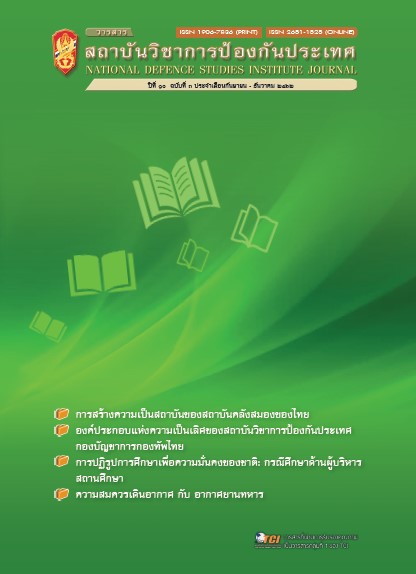Development of Functional Competency Indicators of Military Instructors in Educational Institutes under the Ministry of Defence
Main Article Content
Abstract
The objective of this quantitative research
was to develop competency indicators of Military
Instructors, in Educational Institutes under the
Ministry of Defence. Two-steps of research were:
1) reviewing concepts of management competency
of these Military Instructors through literature
review, and interviewing five experts and
2) investigating competency indicators of school
administrators using a questionnaire, constructed
by the researcher with the overall reliability of 0.98,
applying to a sample of 260 randomly selected
from the Military Instructors. All 260 questionnaire
copies were returned and usable. The statistics used
in the research were confirmatory factor analysis.
The research found of the study showed
that 1) Functional Competency Indicators of
Military Instructors in Educational Institutes under
the Ministry of Defence consisted of 4 components,
13 indicators as follows 1) Teacher Leadership
consists of 5 indicators, namely, Good Personality.
Roll Model. Professionalism. Chang agency And
Communication Skills. 2) Curriculum and Learning
Management consists of 4 indicators: Making
Curriculum, Learning Management, and Instruction
Media. And Learning Measurement and Evaluation.
3) Classroom Management consists of 2 indicators:
Atmosphere Organizer and Classroom Organizer.
And 4) Classroom Research consists of 2 indicators:
Introduction of Research And Research for Improve
Learners. 2) Each factor and indicators were
consistent with the empirical data: ค่า x2 = 40.06,
df = 31, p-value < .05; Relative x2 = 0.14; GFI = .98;
AGFI = .93, RMR = .02; SRMR = .049, RMSEA = .03
The weight of each factor was between 0.65-1.00,
and the standard weight of each indicators
war between 0.56-1.00.
Article Details
The articles, images, tables, graphs, written content, and opinions published in this journal are solely those of the authors and do not necessarily reflect the views or positions of the National Defence Studies Institute or its academic affiliates.
References
กรมวิชาการ. (๒๕๔๒). แนวทางการจัดกิจกรรมเพื่อเสริมสร้างคุณลักษณะดี เก่ง มีสุข. กรุงเทพฯ: โรงพิมพ์การศาสนา.
เทพรังสรรค์ จันทรังษี. (๒๕๕๖). “การพัฒนาภาวะผู้นำครูในโรงเรียนมาตรฐานสากลของโรงเรียนอนุบาลสกลนคร
สำนักงานเขตพื้นที่การศึกษาประถมศึกษาสกลนคร เขต ๑”. วารสารศึกษาศาสตร์ มหาวิทยาลัยขอนแก่น, ๓๗(๑),
๖๘-๗๖.
ประมา ศาสตระรุจิ. (๒๕๕๐). การพัฒนาเกณฑ์สมรรถนะในการประเมินผลการปฏิบัติงานของผู้บริหารศูนย์เทคโนโลยี
ทางการศึกษา สำนักบริหารงานการศึกษานอกโรงเรียน. (วิทยานิพนธ์ศึกษาศาสตรดุษฎีบัณฑิต). มหาวิทยาลัย
ศรีนครินทรวิโรฒ.
พิริยา ศิริวรรณ. ๒๕๕๙. “การสื่อสารภายในองค์กร (คณะแพทยศาสตร์ศิริราชพยาบาล) เรื่องที่ไม่อาจมองข้าม”.
วารสารเวชบันทึกศิริราช, ๙(๑), ๓๘-๔๓.
วนิดา วาดีเจริญ และคณะ. ๒๕๕๖. การจัดการทรัพยากรมนุษย์จากแนวคิดทฤษฎีสู่ภาคปฏิบัติ. กรุงเทพฯ: ซีเอ็ดยูเคชั่น.
วราภรณ์ ศรีวิโรจน์. (ม.ป.ป.). เอกสารประกอบการสอน รายวิชา ๑๐๒๖๓๐๒ การจัดการเรียนรู้และการจัดการชั้นเรียน
(Learning and Classroom Management). ม.ป.ท.
ศศิธร ขันติธรางกูร. ๒๕๕๑. “การจัดการชั้นเรียนของครูมืออาชีพ.” วารสารครุศาสตร์มหาวิทยาลัยราชภัฏเลย, ๑(๒), ๑-๑๙.
สันติ บุญภิรมย์. ๒๕๕๗. การบริหารจัดการในห้องเรียน. กรุงเทพฯ : ทริปเพิ้ล เอ็ดดูเคชั่น.
สำนักงานคณะกรรมการการประถมศึกษาแห่งชาติ. (๒๕๔๐). การบริหารโรงเรียนประถมศึกษา. กรุงเทพฯ: คุรุสภา.
สำนักงานคณะกรรมการข้าราชการพลเรือน. (๒๕๔๘). “การปรับใช้สมรรถนะในการบริหารทรัพยากรมนุษย์” สืบค้นเมื่อ
๑๕ กรกฎาคม ๒๕๖๐, จาก http: //kromchol.rid.go.th/person/compent/competency.pdf
สำนักงานส่งเสริมสังคมแห่งการเรียนรู้และคุณภาพเยาวชน. (๒๕๕๗). สรุปสาระสำคัญการประชุมวิชาการ อภิวัฒน์
การเรียนรู้สู่จุดเปลี่ยนประเทศไทย. ม.ป.ท.
Mc Clelland, David C. 1973. Testing for Competence Rather than for “Intelligence”. American
Phychologist, 28(1), 1-14


